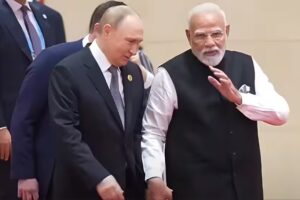
On Tuesday, Xi Jinping presided over a major military parade marking the 80th anniversary of the end of World War II and China’s “War of Resistance Against Japanese Aggression.” The carefully choreographed 90-minute spectacle showcased autonomous military hardware, nuclear-capable ballistic missiles, and a finale featuring the release of 80,000 doves and balloons. Joining Xi in front of the 50,000 spectators in Tiananmen Square were over 25 heads of state, including Russia’s Vladimir Putin and North Korea’s Kim Jong Un. What was on its face a commemoration of the past was interpreted by many observers as a display of China’s present power on the international stage. Xi declared, “The rejuvenation of the Chinese nation is unstoppable.” David Pierson from The New York Times, who was told to be in position at 2:45 a.m. along with other journalists covering the parade, reported on the symbolism and significance of the event:
The parade was the highlight of a weekslong campaign by the ruling Communist Party to stoke nationalism, recast China’s role in World War II and project the party as the nation’s savior against a foreign aggressor, Imperial Japan. The evoking of wartime memories serves to rally domestic Chinese support in the face of economic uncertainty and tensions with the United States, which Mr. Xi has accused of trying to contain and suppress China.
“The Chinese nation is a great nation that fears no tyranny and stands firm on its own feet,” Mr. Xi declared from the rostrum of Tiananmen Gate, above a large portrait of Mao Zedong.
He drew a direct line between the sacrifices of World War II and the challenges that China says it faces today.
“When faced in the past with a life-and-death struggle between justice and evil, light and darkness, progress and reaction, the Chinese people united in hatred of the enemy and rose up in resistance,” he said. He cast today’s tensions as another fateful choice, between peace or war, dialogue or confrontation, and said China would side with progress. [Source]
The event generated a lot of attention on Chinese social media. Manya Koetse from What’s On Weibo wrote that leading up to the parade there were about 225 different popular hashtags on social-media platforms Weibo, Douyin, and Kuaishou related to the parade and its preparations, with most of them (“about 60%”) related to military themes, followed by the parade’s international significance (“18%”). In a viral Zhihu post about what people looked forward to most about the parade, one respondent said: “I hope they’ll spend less money and use it towards improving people’s livelihoods.” Taiwanese officials estimated that Beijing spent $5 billion, or two percent of China’s annual defense budget, on the parade. Comparing Xi’s parade to Donald Trump’s controversial military parade in June, one Weibo user wrote, “China’s military parade: A showcase of national power. US military parade: A showcase of relaxation.”
Chinese internet users were also intrigued by the hot-mic moment between Xi and Putin about extending longevity, in which Putin said that continually transplanting organs could allow people to achieve “immortality.” Some wondered whether Xi’s response about people potentially living for 150 years may have been a reference to the 981 Project, a Chinese project for top CCP leaders with the explicit goal of extending their lifespans to 150 years of age. An ad for the project was previously blocked on WeChat in 2019. After the parade, searches for “150 years” were censored on Weibo.
A recent censorship directive, leaked online and later translated by CDT, advised cyber-regulators to “[e]xercise vigilance against the propagation of erroneous historical views about World War II that distort or negate the righteousness of the global victory against fascism, or that belittle China’s major contributions to the World War II victory.” It also warned against “American and Western anti-China forces intensifying their competition with us for discourse power over the history of the war.”
Perhaps the most notable image from the event was a “symbolic walk of solidarity” and “show of strength” by Xi, Putin, and Kim, who had never before appeared together in public (it was also the first time that Kim had attended a major multilateral event). For Wen-ti Sung, a non-resident fellow at the Atlantic Council’s Global China Hub, this showed that “China is unafraid to stand by its friends and be their literal fellow traveller, even and perhaps especially when they are pariahs in the court of international public opinion.” Among some of the Chinese comments on X reacting to the three leaders’ joint appearance were: “All three countries have leaders for life, cut from the same cloth,” and “The grandson is in the middle, the father is on the left, and the son is on the right.”
Analysts widely agreed that the purpose of the event was to project strength, particularly for domestic audiences. Jennifer Parker, an adjunct fellow in naval studies at UNSW Canberra, said: “You don’t do a parade like this to commemorate the end of world war two. You do a parade like this to show force.” “For the domestic audience the goal is to rally national pride, present the [Communist Party] as the guardian of China’s sovereignty, and flaunt the military that Xi has invested so heavily in,” said Daniel Russel, a former senior State Department official, now at the Asia Society Policy Institute. Kerry Brown, professor of Chinese studies at King’s College London, said the parade was “a great assertion of China’s prowess and advancement and strength, so it’s great for domestic propaganda.”
As the South China Morning Post described, the event “was also an attempt by Beijing to cement its global leadership status and to show its rising diplomatic clout.” A Le Monde editorial stated that it “placed [Xi] at the center of the world stage and promoted his vision of rebalancing the international order in the face of the US, an increasingly unpredictable superpower.” Jeff Kingston, a professor of Asian studies at Temple University Japan, said that the parade “showcases the ascendancy of China propelled by Trump’s inept diplomacy and President Xi’s astute statecraft,” adding, “The Washington consensus has unraveled, and Xi is rallying support for an alternative.” Chun Han Wong at The Wall Street Journal wrote about how Xi’s victory celebration this week is part of a broader goal of recasting the history of World War II to boost Beijing’s global standing in its rivalry with the U.S.:
“Xi Jinping is rewriting the history of the Second World War” to serve his political interests, said Hans van de Ven, a professor of modern Chinese history at Cambridge University.
[…] Abroad, Chinese diplomats have stressed that China helped defeat the Axis powers and build an international order centered on the United Nations—a multilateral system that Beijing accuses President Trump of trying to dismantle to advance his “America First” agenda.
In its place, Beijing has cast itself as a force for global stability.
China’s Communist Party, by stressing its role in World War II, is seeking “co-ownership of the postwar international order,” said Rana Mitter, a China historian at Harvard’s Kennedy School of Government. The goal is to cast Beijing as a rule-maker in global governance, not a revisionist power trying to rewrite the rules, Mitter said. [Source]
The triumphalism of the parade built on momentum from the annual summit of the Shanghai Cooperation Organization (SCO) in Tianjin on Sunday. At the summit, Xi held bilateral meetings with over a dozen other leaders, including Putin, who said that China-Russia relations “are at an unprecedentedly high level.” Xi also announced a series of new measures to advance the China-led regional organization, including a new development bank; $280 million in aid and $1.4 billion in loans to member states; and coordination platforms for cooperation on energy, sustainable industry, and digital trade. Most notably, Xi introduced the “Global Governance Initiative” (GGI), the fourth of China’s global initiatives following the Global Development Initiative, Global Security Initiative, and Global Civilization Initiative. According to an official concept paper, the GGI rests on five pillars: sovereign equality, international rule of law, multilateralism, a “people-centered” approach, and real results. Eric Olander of the China-Global South Project argued that the SCO summit and GGI are the latest examples of Xi’s successful attempts to rally the Global South around a Chinese-led alternative to much of the U.S.-led global instability:
There was a noticeable difference in the mood and the atmosphere at the summit, particularly among the big powers, that one wouldn’t have expected given the challenges that India, Russia, and China are facing from the U.S. Clearly, the likes of Xi and Putin feel that momentum is on their side in their confrontation with a West that is now so divided, it’s hard to even say what the “West” is anymore.
[…] Finally, Xi is trying to mainstream his Community for Common Destiny (CCD) policy framework with the introduction of the new Global Governance Initiative (GGI)[…]
With the GGI, Xi is basically saying the quiet part out loud, that China is seeking to create a parallel global governance system outside of the U.S. and European-led order, something that would have been inconceivable a decade ago, but now very much feels possible given the plummeting levels of trust in U.S. global leadership and the demand from Global South countries for a greater say in international affairs. [Source]





